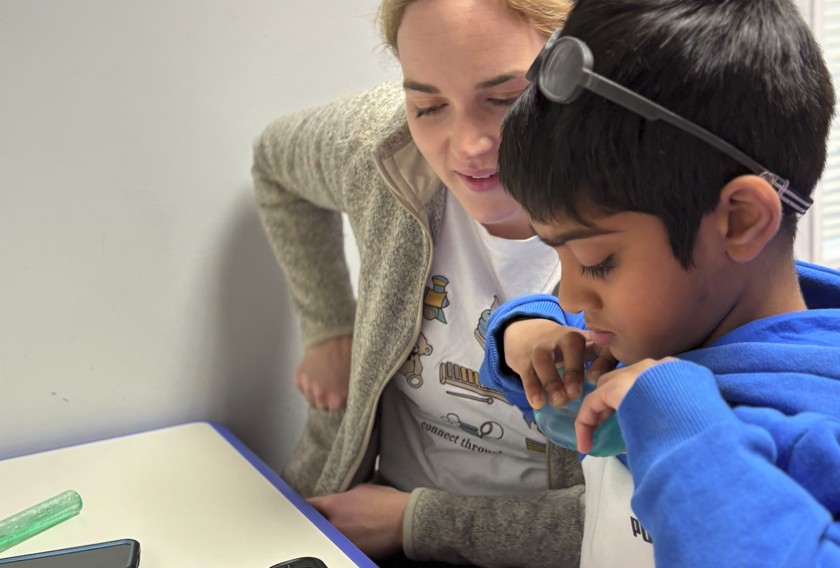Autism Spectrum Disorder (ASD) Pediatric Therapy | Durham & Chapel Hill
Understanding Autism Spectrum Disorder in Children
Across North Carolina, approximately 40,000 families receive direct support for a family member with autism every year— and nationally, roughly 1 in every 36 children will be diagnosed with the condition. But what does an autism diagnosis mean for your child?
Every person with autism is affected differently — hence why the condition is referred to as a spectrum, with varying levels of severity. This makes it particularly critical that each child have a specialized care plan providing the structural support to help them achieve their developmental milestones.
Read on to learn more about how multidisciplinary clinics like Therapy Smarts can help children turn challenges into triumphs!
Smart Start
What Causes Autism?
Researchers are still investigating the cause of autism, but it is suspected to be a combination of factors. Current findings suggest that there may be a genetic component, while other investigations allude to an imbalance of brain chemicals or a physical problem with the area of the brain responsible for processing language.
Autism is not caused by vaccines, per the Center for Disease Control (CDC).
Have Questions? We are Here to Help
Common Signs of Pediatric Autism Spectrum Disorder (ASD)
Children with ASD may have problems with social, behavioral and communication skills. How specifically autism manifests itself varies based on the individual, and the level of severity. There are three recognized levels of autism, outlined below:
- Autism Level 1: Requiring Support
- Formerly known as “high functioning autism,” children at this level may struggle with social interactions or changes to routine, but by and large can build and maintain independent living skills.
- Autism Level 2: Requiring Substantial Support
- Children diagnosed with level 2 autism face more apparent challenges in daily life. They may have limited verbal communication, or have strong preferences for established routines. Although a level of support will likely be needed in daily life, proper support systems can help them build connections, develop skills and live an enjoyable and fulfilling life.
- Autism Level 3: Requiring Very Substantial Support
Children diagnosed with level 3 autism present the greatest level of difficulty regarding social interaction and behavioral flexibility. They may struggle with activities of daily living, or communicating their basic needs. With individualized supports in place, these children can experience a significant improvement in their skills and quality of life.
Start Your Child’s Autism Therapy Journey in Durham & Chapel Hill, NC

How can I Find the Right Child Autism Therapy?
For families seeking effective child autism therapyand support, especially in the Durhamand Chapel hill, NCareas, the first definitive step is securing a formal diagnosis.
1. Schedule a Psychological Evaluation: This step is crucial for a formalized diagnosis.
2. Caregiver Questionnaire: Parents and caregivers complete detailed questionnaires regarding developmental milestones and everyday behaviors as requested by your psychologist.
3. Formal Evaluation: Your psychologist will use a diagnostic tool that evaluates social skills and repetitive behaviors in a child. Based on your child’s age, this will be more play-based for young children, and more conversational as the child gets older, depending on their language skills.
Developing a Plan of Care
If an Autism Spectrum Disorder diagnosis is determined, your therapist develops an Individualized Plan of Care (IPOC). This plan outlines the specific supports that will help your child thrive.
As a comprehensive provider, our supports often include:
- Applied Behavioral Analysis (ABA) Therapy: We offer focused, intensive ABA autism Durham programs, like our successful preschool-readiness program.
- Speech Therapy for Autism:Essential for improving communication skills, a core component of our integrated services.
- Occupational Therapy: To address sensory processing and daily living skills.
What is a Pediatric Applied Behavioral Analysis (ABA) Therapy
Applied behavioral analysis or ABA is a research-backed behavioral therapy designed to reinforce positive behaviors and teach children with autism the skills to support themselves in everyday life. How this looks will depend on the specific skills that your child is looking to work on.
At Therapy Smarts, our ABA program — FUNction Junction — is centered around school readiness for children on the autism spectrum from ages 2 to 10. Hosted in a natural preschool setting, children are introduced to school routines like circle time and encouraged to engage in creative and engaging interactions with their peers. Additionally, each child’s behavioral technician takes periodic time to work on each child’s individual milestones in productive one-on-one sessions.
As the name suggests, we balance fun and function in everything we do, with programs in both Durham and Chapel Hill, NC. Our aim is not to restrict a child’s behavior, but to understand the underlying reasoning behind it. From there, our trained professionals can determine strategies to address these triggers in a supportive, positive way, mitigating and avoiding socially-significant behaviors that may pose a disruption or danger to a child or those around them.
Wondering About Developmental Milestones?
Have questions about your child’s development, or wondering if a certain diagnosis may be a fit? Try out our developmental screening tool— it’s a fast, free way to get a snapshot of your child’s progress on his or her developmental milestones.
Ready to Find the Right Autism Therapist for your Child?
Call 919-378-1340 or Click Here to Schedule a Consultation with an Autism Specialist Today


